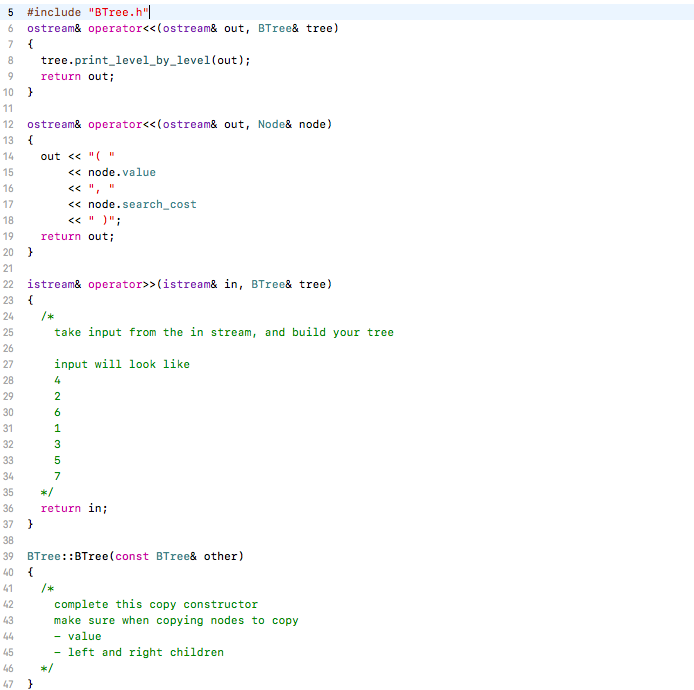

So, first of all, we wrap the loop body in curly braces to protect against goto fail and then we factor it out into a function. You have the following snippet repeated three times: for (const auto& THING : THINGS)
#Istream operator code#
You should test your code and see if it does what you wanted. Std::getline(is, ace, ',') // shouldn't this last one be '\n' not ','? std::getline(is, readable.murderer, ',')

It also stops without extracting the element in question, if an insertion fails or throws an exception (which is caught but not rethrown).
Any push into the right direction is highly appreciated.ĩ5 percent of programming is looking for redundancies and eliminating them.įor example, why do you bother with reading strings into accusations first, and then later copying them into readable.murderer et cetera? Why not just read them directly into readable.murderer? This would have the bonus of eliminating those "magic number" indices 0, 1, and 2, and replacing them with readable (no pun intended) identifiers. basicistream& operator> ( basicstreambufThe first element has to be in clue::characters (an array of possible game characters), second element in clue::weapons, and third element in clue::places.Ĭan somebody suggest a cleaner way to overload this operator? The code works as expected, but I believe that there is a lot of space for improvements. I am reading input as green, dagger, kitchen and storing it in my accusation. check it matches one of the clue::places check it matches one of the clue::weapons check it matches one of the clue::charactersįor (const auto& character : clue::characters) Std::transform(pushable.begin(), pushable.end(), pushable.begin(), ::tolower) If (pushable.size() != 0) pushable.pop_back() //remove that last white space While (ss > word) pushable += word + " " I have overloaded my extraction from istream operator as follows: std::istream& operator>(std::istream& is, accusation& readable) whether the stream extraction and insertion operator is part of the ostream and istream respectively what does the part highlighted in. This is not possible for user-defined classes, since we are not allowed to modify C++ Standard Library classes.
Lhs << "x: " << rhs.x << " y: " << rhs.y << " z: " << rhs.I have the following very simple class: class accusationĪccusation(std::string, std::string, std::string) įriend std::ostream& operator>(std::istream&, accusation&) To be a member function, operator << would have to be a member of class ostream.Std::ostream& operator<<(std::ostream& lhs, const Vector& rhs)

Example: const Vector&.Įxample: //Overload std::ostream operator<< to allow output from Vector's T), passed by const& instead of value for performance reason ( rhs shouldn't be changed anyway). Sign: It indicates the sign of overloaded I/O operator. The return type for overloaded stream extraction operator is ostream& and for overloaded stream insertion operator is istream&.


 0 kommentar(er)
0 kommentar(er)
